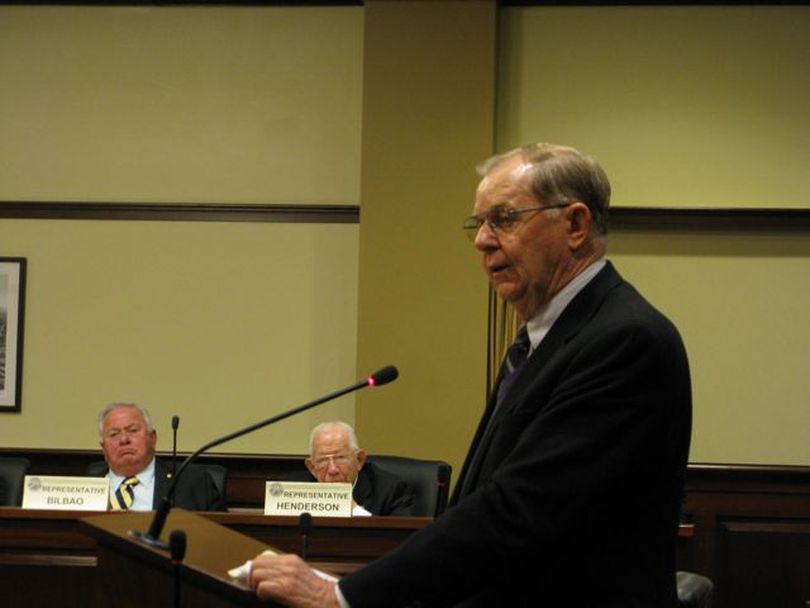Lawmakers who later take state jobs would lose special pension boost, under new bill

Idaho lawmakers would no longer be able to "spike" their retirement pensions by taking a high-paying state job for a short time after a long legislative career, under legislation introduced today at the urging of Rep. Dennis Lake, R-Blackfoot. Lake told the House State Affairs Committee that in 1990 - and retroactive to 1985 - the Legislature created a special exemption for itself, so that lawmakers who take end-of-career state jobs are treated differently than all other elected officials. As a result, a legislator who serves for 13 years would earn a PERSI retirement pension of about $350 a month, Lake said, but one who served 10 years as a lawmaker and then took an $80,000-a-year state job for 42 months would get $1,782 a month, the same as if he'd served in the higher-paying job for 13.5 years.
"We don't believe this is quite right. In fact, it's unconscionable for a policy-setting body such as we are to allow this practice to continue," Lake said. He noted that he introduced similar legislation late in last year's session, but it didn't have time to proceed. The committee voted unanimously to introduce the bill, which would treat lawmakers the same as all other elected officials; that means their years of parti-time legislative service would be blended with later, higher-paying state jobs to determine their PERSI retirement benefit. Click below for a full report from AP reporter John Miller.
Idaho rep looks to cut back retirement perks
By JOHN MILLER, Associated Press
Boise, Idaho (AP) — Rep. Dennis Lake wants to change a law passed more than 20 years ago that he says allows retired elected officials to pad their retirements at the expense of taxpayers, saying it's "unconscionable" to continue such a practice.
Two of the Blackfoot Republican's proposals aimed at legislators' benefits are now in the House, and he's leading separate talks over how to close a gap in a pension system for state judges that's underfunded by $14 million.
Lake, testifying Tuesday before the House State Affairs Committee, urged lawmakers to end a pension perk that lets lawmakers "spike" their benefits by taking a higher-paid state appointment for 42 months at the end of their careers.
Lawmakers approved this special benefit for themselves during the 1990 session, but Lake contends it's outlived its usefulness, saying those who advance to higher-paid appointments are padding their retirements.
"It's unconscionable," he said, "...to allow this practice to continue. We're just going back to being treated the same way as other elected officials."
Lake says that under current law legislators who serve 14 years in the Idaho House or Senate before retiring are eligible for a monthly benefit of $350 when they turn 65. By contrast, he says, a lawmaker who serves 10 years then takes a state appointment for the next 3 ½ years would collect a retirement benefit of $1,800 per month.
Lawmakers have long parlayed legislative experience into public service jobs beyond the Statehouse, including former Nampa Republican Rep. Bill Deal, who was appointed in 2007 as director of the Idaho Department of Insurance, and former Boise Democrat Sen. David Langhorst, now one of Idaho's four tax commissioners.
Another of Lake's measures working through the House aims to close a loophole that allows lawmakers who live near Boise to collect higher benefits than those from farther away.
Lake also is pursuing a deal where elected judges would pay more for their pensions and see reduced benefits.
For instance, Lake says, a district court judge earning $112,043 who retires at 55 after 16 years on the bench can get $82,000 annually. Surviving spouses get half of the benefit after the judge dies.
That compares with the system for regular state employees, where a similarly situated retiree earning $112,000 would get $36,000 annually — but would have to wait until 65 to retire and couldn't direct nearly much to a surviving spouse.
Also, since the year 2000 the outflow contributing to the judges' retirement fund has fallen progressively further behind on its obligations. It currently needs $1.3 million annually in additional funding to cover payouts over 25 years, if nothing is changed.
Sitting judges are naturally reluctant to reduce benefits for those who join the bench in the future, for fear of undermining one of their recruitment tools.
Draft legislation could be ready Friday to increase judges' payments and hike court fees, while reducing benefits for spouses.
Courts administrator Patti Tobias didn't return a call Tuesday seeking comment on a potential agreement.
Copyright 2012 The Associated Press.
